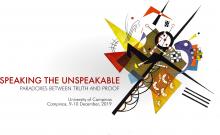O Instituto de Filosofia e Ciências Humanas sediará o evento Speaking the Unspeakable: Paradoxes between Truth and Proof, dias 09 e 10 de dezembro, na Sala Multiuso.
O evento contará com mesas com Eduardo Barrio (Universidade de Buenos Aires, Argentina), Neil Barton (Universidade de Constança, Alemanha), Guilherme Araújo Cardoso (Universidade Federal de Ouro Preto), Rodrigo Freire (Universidade de Brasília), Samuel Gomes da Silva (Universidade Federal da Bahia), Leon Horsten (Universidade de Constança, Alemanha), Paolo Pistone (Universidade de Bologna, Itália), Lucas Rosenblatt (Universidade de Buenos Aires, Argentina), Paula Teijeiro (Universidade de Buenos Aires, Argentina) e Luca Tranchini (Universidade de Tubinga, Alemanha).
Outras informações podem ser obtidas no site do evento.
Since Cantor’s discovery of the paradox of the greatest cardinal number, between 1895 and 1899, nearly a century passed until Stephen Yablo published a variant of the liar paradox which make no use of self-reference. While today paradoxes are widely recognized as fruitful sources of new insights both in logic and mathematics, a precise and encompassing characterization of what is a paradox is still missing.
We argue that a deeper understanding of paradoxes requires resources coming from both truth-theoretic and proof-theoretic conceptions of language and meaning. This workshop is intended to investigate some specific recent proposals for such characterizations. More precisely, the aim is to create a bridge between the truth-theoretic and proof-theoretic traditions in the analysis of paradoxes.
The main questions addressed by the workshop are:
• What are the criteria for paradoxality? Is it possible to provide identity criteria for paradoxes ?
• Is it possible to distinguish between fundamentally different types of paradoxes and their solutions ?
• How to characterize the interplay between mathematical abstraction and paradoxes ?
• What is the nature of the knowledge obtained from paradoxes and their solutions ?
Local Organizing Committee
Giorgio Venturi (University of Campinas) – Co-chair
Mattia Petrolo (Federal University of ABC) – Co-chair
João Vitor Schmidt (University of Campinas)
Programação:
09 de dezembro
09:15 – Opening
09:30 – L. Horsten, On Reflection
10:30 – R. Freire, Avoiding paradoxes of unlimited set-formation and the foundations of set theory
11:30 – P. Teijeiro, Vague Connectives
12:30 – Lunch break
14:00 – S. Gomes, On striking, counterintuitive partitions — or: The Axiom of Choice is not be blamed of anything
15:00 – P. Pistone, From Frege to Haskell: impredicativity and paradox in logical systems and programming languages
16:00 – Coffee break
16:30 – L. Ronsenblatt, Paradoxes and Hypodoxes
17:30 – G. A. Cardoso, Counterpossibles and Curry
10 de dezembro
09:30 – E. Barrio, Paradoxes, Contradictions and Circularity
10:30 – N. Barton, Systems of Set Theory in which every Set is Countable
11:30 – L. Tranchini, Proof, paradox and the semantic role of hypothetical reasoning
12:30 – Closing

